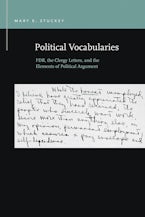Political Vocabularies
FDR, the Clergy Letters, and the Elements of Political Argument
Published by: Michigan State University Press
Series: Rhetoric & Public Affairs
Imprint: Michigan State University Press
Publishing Date: 2018-03-01
298 Pages, 6.00 x 9.00 in
Other Retailers:

